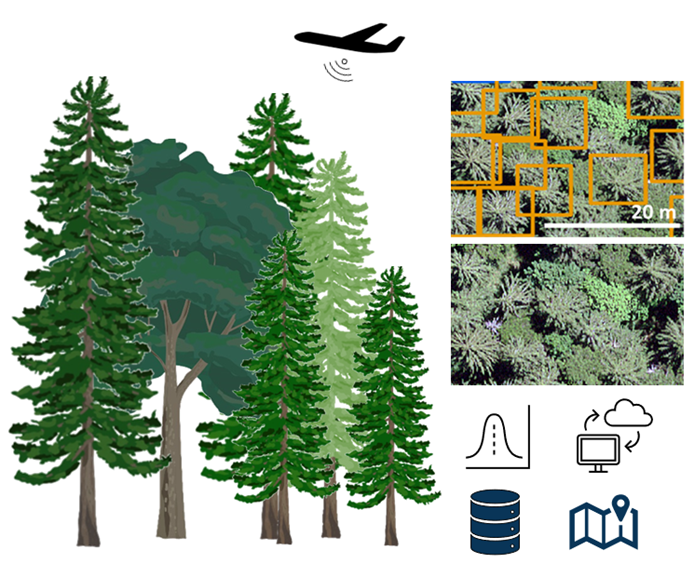Mapping spruce density using aerial imagery and deep learning
Background:
Understanding forest structure, including species-specific density, is essential for sustainable forest management and climate resilience. Spruce (Picea abies) a dominant tree species in Swiss forests, plays a critical ecological and economic role, yet quantifying its density over large areas remains challenging. While traditional methods rely on labor-intensive field surveys, advancements in high-resolution remote sensing and deep learning enable the extraction of tree-level information across large spatial scales. True-color near-infrared (RGBI) aerial imagery, combined with deep learning, provides a promising approach for accurate, scalable mapping of spruce density.
Aim:
This study aims to develop an approach for mapping spruce density across Switzerland. The project focuses on detecting individual spruce trees and estimating their density in mixed forest landscapes.
Methods:
Field inventories (>10000 spruce annotations) and RGB imagery will be integrated. convolutional neural networks or vision transformers will be implemented to detect individual spruce trees. Analysis and model training will be conducted using Python for deep learning.
Wanted:
A highly motivated student interested in remote sensing and deep learning and willing to learn new practical techniques and ecological concepts.
You will get to:
- Learn where trees spruce trees are located and, more importantly, how to quantify tree density with deep learning across the Swiss forests.
- Get familiar with the latest developments in remote sensing data processing and analyzing.
- Gain important statistical knowledge for future work.
- Expand your network by discussing your work with experts from the intersecting fields of forest sciences, and computer sciences.
- Be a co-author on a publication resulting from this work.
- Be part of a motivated, fun, and energetic team of scientists.
Supervisor:
Dr. Lukas Drees from the Department of Mathematical Modeling and Machine Learning at the University of Zurich and Dr. M. Beloiu Schwenke from the Department of Environmental Systems Science at ETH Zürich.
The project has a flexible starting date.
If the idea of participating in cutting-edge interdisciplinary research excites you, please contact mireal.beloiu(at)usys.ethz.ch or lukas.drees(at)uzh.ch. The FORM team is looking forward to hearing from you!
